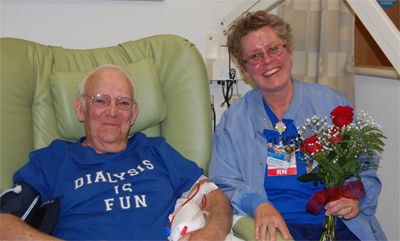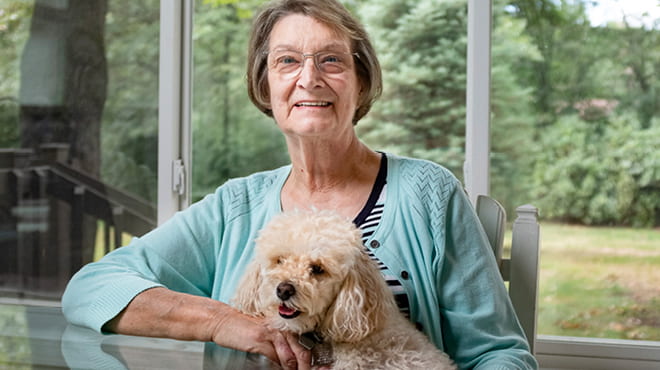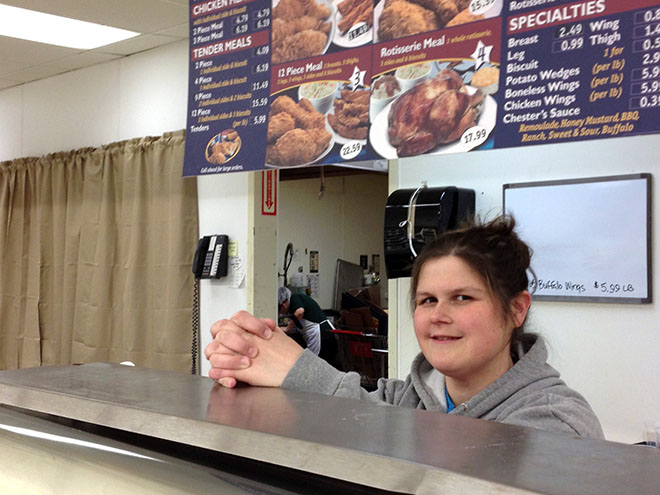Recent Posts
-

-
 Patient StoriesA lifesaver saved: An EMS veteran’s journey from rescue to recoveryNovember 14, 2025
Patient StoriesA lifesaver saved: An EMS veteran’s journey from rescue to recoveryNovember 14, 2025 -

Dialysis is ... fun?

For Cliff Anderson, dialysis has been a series of ups and downs.
Anderson, a Glenwood City resident, has struggled with kidney issues for over 40 years. Both his brother and two of his nephews died of kidney failure at a relatively young age. After feeling nauseated and weak, and being hospitalized several times within a few months, Anderson was diagnosed with renal kidney failure in May 2014. He began dialysis treatments two weeks later.
Dialysis is a treatment for people who have kidney failure. Dialysis often is the last step for people waiting for a kidney transplant.
Upon receiving news that he needed dialysis in order to keep living, Anderson felt devastated and wanted to give up. Although he has a wonderful wife and a supportive family, traveling and attending dialysis was difficult for him and, at times, he felt like he wanted to die. “I didn’t want to accept that I would need dialysis for the rest of my life to stay alive,” says Anderson.
Anderson receives dialysis treatments three times a week at the Mayo Clinic Dialysis Center in Menomonie. His wife, Jean, drives him to his treatments and stays at the center during every treatment. His four children and five grandchildren frequently visit him during his treatments, and he brings a framed picture of his grandchildren with him every time.
Anderson routinely feels weak, tired and lacks ambition after dialysis treatments. Depression and feelings of loss of control are common among dialysis patients. For many, dialysis dramatically changes their lifestyle.
“Because of the medicine changes, lifestyle changes and diet restrictions, patients require a lot of support,” says Jennie Wise, Dialysis. “All of these changes can be emotionally and physically draining.”
Dialysis patients have a team of medical professionals working with them, including nurses, patient care technicians, dietitians, social workers and physicians to help support the patient and family. These medical professionals have a unique opportunity to get to know each patient, because they are seen regularly at their treatments.
Wise played an integral role in lifting Anderson’s spirits when he was feeling down about dialysis. Wise laughs with her patients and thanks them for coming after every treatment in order to influence a positive attitude, put a smile on their face and cheer them on. After over 13 years of working in Dialysis, Jennie’s motto is “Dialysis is fun!”
Anderson’s family began using the phrase “Dialysis is fun!” to help him cope with this change in his life. For his birthday, his daughter, Teresa, made him a T-shirt with the phrase printed on it. He now owns three different colored T-shirts that he wears when he receives treatments.
When asked how he feels when he wears his T-shirt, Anderson says, “It makes me feel better…at least I am alive.”
Anderson’s wife said upon receiving his T-shirt, his attitude about dialysis seemed to change. His spirits were lifted, and he seemed more accepting of his condition. His change in attitude was noticed by the employees at the dialysis center, as well.
After seeing Anderson’s optimism, Jessica Zeman, Dialysis, began asking patients at the Menomonie and Barron dialysis centers what they thought of dialysis. She asked them to complete the phrase “Dialysis is…” and created a bulletin board displaying patients’ responses on colorful paper T-shirt cutouts. Employees at these locations had T-shirts made saying “Dialysis is…” with patient responses on the back. Answers have included: “Lifesaving,” “what you make of it,” “a time to sleep” and “a no-brainer.” The initiative has continued to encourage positive attitudes for both dialysis patients and employees.
“There is a nice family bond with dialysis patients,” says Anderson. “You have your actual family, and you have your dialysis family.”
Anderson and his wife are thankful for the dialysis center in Menomonie. The employees are supportive and encouraging, and keep a watchful eye on their patients.
As for Anderson, his long-term goal is to make it to see his only granddaughter graduate from high school in two years. He continues to come for his dialysis treatments with the support of his family and dialysis team. He has remained out of the hospital for many months and continues to wear his T-shirt, inspiring those around him.



